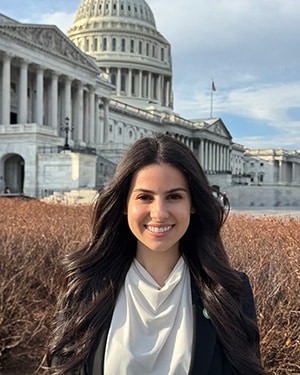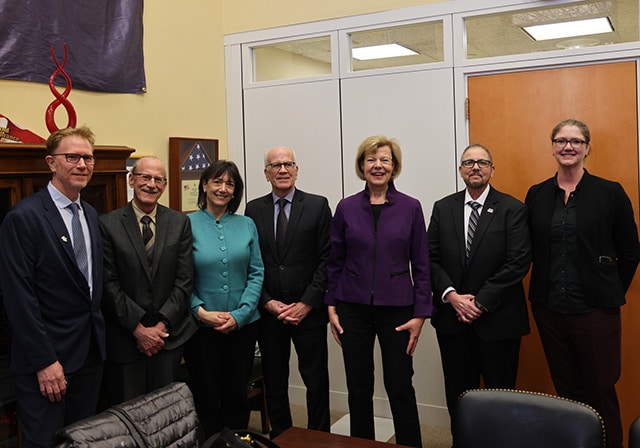Originally founded in 1887, the National Institutes of Health (NIH) has not only become a key component of medical research in the United States, but one of the foremost research centers in the world. Between 2010 and 2019, 354 out of the 356 therapeutics approved by the U.S. Food and Drug Administration (FDA) involved research that was at least in part funded by the NIH. Concerned about the NIH’s ability to contribute to medical research at the same pace under the new administration, Senators Tammy Baldwin (D-WI) and Peter Welch (D-VT) hosted a congressional forum on March 26 called “Cures in Crisis: What Gutting NIH Research Means for Americans with Cancer, Alzheimer’s, and Other Diseases.”
Baldwin kicked off the session detailing several actions the administration has taken in its first few months that are slowing progress in medical research. On his second day in office, President Trump paused all public communications by the Department of Health and Human Services (HHS), which Baldwin said, “threw sand in the gears of the NIH grant-making process, stopping the very meetings that greenlight funding for research and clinical trials.” So far, the administration has stopped the release of $1.7 billion in funding to begin or continue research and canceled more than 300 NIH grants. At the time of the forum, Baldwin noted how more than 1,000 NIH scientists and grant administrators had been fired. The next day, the administration announced a plan to cut 10,000 more employees across HHS agencies.
“We can all agree that government should be more efficient, but … cures for Alzheimer’s disease and cancer are not waste or fraud or abuse,” Baldwin said.
Former NIH Director Monica Bertagnolli, MD, was invited to the forum as one of five witnesses. She explained how NIH funding also fuels the economy in addition to supporting research for lifesaving medicines. In 2024, every $1 of funding dedicated to NIH research generated an estimated $2.56 in economic activity, which totaled $94 billion for communities across the nation.
“Today, we are just beginning to see progress against devasting diseases, which have long been hopeless—Alzheimer’s disease, ALS [amyotrophic lateral sclerosis], diabetes, even pancreatic cancer—all because of NIH funding,” Bertagnolli said. “How can we afford to see this progress stalled?”
The Impact of NIH Cuts on Cancer Research
Bertagnolli stressed that her most relevant role at the forum was that of a cancer survivor: “I would not be here without biomedical research funding by the NIH.”
She also emphasized that she was not the only one. Between 1991 and 2022, the age-adjusted death rate from cancer in the United States fell by 34%, which means about 4.5 million people survived cancer thanks to NIH-funded advances in treatment, early detection, and prevention.
In a statement released in February, the American Association for Cancer Research (AACR) expressed its own concerns about how cuts to the NIH could threaten progress against cancer. Since then, the organization has been active in spreading this message, including suggesting Larry Saltzman, MD, to serve as a witness for this forum.
Saltzman previously shared his story for the AACR COVID-19 and Cancer Report, where he described his diagnosis of chronic lymphocytic leukemia (CLL) and the several treatments and clinical trials that have kept him alive. In total, he has participated in six clinical trials, been on more than a dozen different treatments—including two CAR T-cell therapies—and survived 10 relapses.
“Because I needed treatments that hadn’t yet been approved, I enrolled in clinical trials,” Saltzman said at the forum. “I quickly learned that living with a diagnosis like mine means constantly building bridges—from one treatment to the next—hoping each one holds long enough for research to catch up with my disease.”
Saltzman acknowledged that even with all of his connections as a former family physician, a former healthcare IT entrepreneur, and a former executive research director at the Leukemia and Lymphoma Society, surviving CLL was never easy.
“But most patients don’t have those advantages, and, without NIH support, many simply cannot afford to participate in clinical trials even when it may be their only hope,” Saltzman said. “For them, NIH funding is the difference between a chance and no chance.”
During the forum, several senators also used their time to speak about the potential ramifications these cuts are having or could have on cancer research. Among them were Patty Murray (D-WA) and Maggie Hassan (D-NH). Murray said that it was her understanding that so far 14 NIH grants focused on cancer research have been terminated, with six of these specifically focused on cancers in women. Meanwhile, Hassan learned that Dartmouth Cancer Center has experienced a delay in receiving the NIH funding it gets as a National Cancer Institute (NCI)-designated cancer center, and asked Bertagnolli to comment on the importance of these centers.
“Comprehensive cancer centers are a crown jewel of the NCI,” Bertgnolli said, adding how such centers strive to take a comprehensive view of cancer from fundamental biology to care delivery in the communities. “It has to be a virtuous cycle—the laboratory has to learn from the clinic, which has to learn from the community … it all has to be a part of everything we do if we are going to conquer cancer.”
Bipartisan Support for Funding Medical Research
The other witnesses included Alzheimer’s disease researchers Sterling Johnson, PhD, of the Wisconsin Alzheimer’s Disease Research Center at the University of Wisconsin-Madison, and Whitney Wharton, PhD, of Emory University, who spoke about the importance of funding research for this disease as incidence in the United States continues to rise. Finally, Jessy Ybarra, a veteran living with ALS and member of the ALS Association’s Board of Trustees, not only made an impassioned plea for funding, but also played a recording from his 10-year-old son.

“I have goals and dreams to achieve that I need my dad by my side to show me and guide me along the way,” his son said. “The NIH can help my dad, and many others, live longer so we can have just a little more time to make memories with our loved ones. I am not ready to say goodbye to my best friend, my dad.”
As Dick Durbin (D-IL) explained, Congress has long supported funding for the NIH. Ten years ago, he formed a bipartisan team of senators who have worked to increase the NIH’s budget from $30 billion a year to $48 billion over that span. But now he is concerned those gains could be lost with the cuts being made and proposed to the NIH. Durbin indicated that bipartisan support would again be key to ensuring funding for medical research at levels similar to what we have been able to achieve in the past.
As a result of the success of the forum, Senators Susan Collins (R-ME) and Patty Murray (D-WA), chair and vice chair of the Seante Appropriations Committee, have announced a full bipartisan committee hearing series titled “Biomedical Research: Keeping America’s Edge in Innovation.” The first hearing in the two-part series will be held on April 30 and will feature discussions from researchers, patient advocates, and others about the importance of U.S. biomedical research. The second hearing, which is not yet scheduled, will include witnesses from the administration who will talk about the federal government’s role in funding research.
More From the AACR
The AACR has been actively advocating for Congress to restore stability to the NIH and reaffirm its long history of steadfast and bipartisan support for medical research. On February 26, the AACR hosted the 10th annual AACR Early-career Hill Day where 18 students, trainees, and early-career scientists from across the country met with members of Congress and/or their staff to express the importance of cancer research. Over the course of the day, these individuals attended more than 50 meetings on Capitol Hill.
One of this year’s participants, Natalie Snider-Hoy, PhD candidate at Wayne State University, wrote about her experience and explained that while things felt different this year, the message remains the same: “Robust, sustained funding for the NIH and NCI is critical to support our fight against cancer for all Americans.”

The AACR is also planning more events throughout the year, including a session at the upcoming AACR Annual Meeting 2025, April 25-30 in Chicago, on “Cancer Research at a Crossroads: Sustaining Progress Against Cancer for the Benefit of Patients.” This special session will include AACR President Patricia M. LoRusso, DO, PhD (hc), FAACR, along with former NCI directors Bertagnolli and Kimryn Rathmell, MD, PhD; E. John Wherry, PhD, FAACR of the University of Pennsylvania Perelman School of Medicine; patient advocates Kristen Dahlgren and Saltzman; early-stage investigator, Cody Wolf, MS, PhD; and more.
Other events being planned include a Lunch and Learn Impact series in which congressional staffers are invited to hear from panelists in different areas of cancer research, a continued partnership with the Association of American Cancer Institutes (AACI) for AACR-AACI Hill Day on May 22, a special congressional briefing by the Fellows of the AACR Academy in July, and another congressional briefing about the 15th annual AACR Cancer Progress Report on September 17 followed by the 13th annual Rally for Medical Research, of which the AACR is the founding organizer, the next day.
Additionally, the AACR is working on a new initiative to take the Rally for Medical Research “On the Road.” The plan is to organize meetings and/or events in certain congressional districts and states when Congress is in recess to allow researchers and patient advocates from those areas to meet with their representatives and showcase the transformative impact of NIH funding across the respective states—not only from cancer research but also in countless other areas of medicine, including infectious diseases, maternal health, mental health, and chronic disease prevention. Alabama, Louisiana, Oklahoma, and West Virginia are among the first states that will be visited later in 2025 or 2026.
The AACR Cancer Centers Alliance, which originally formed in September 2023 to facilitate collaboration among the nation’s cancer centers on shared goals, will also meet to discuss potential progress and next steps for its 94 members. Additionally, the AACR Cancer Research Training and Education Coordination (CRTEC) associate directors and the CRTEC Associate Directors Steering Subcommittee will hold separate meetings to discuss education and training initiatives, as well as short-term and long-term objectives.
But you don’t have to wait for any of these future events to make your voice heard in support of NIH’s lifesaving medical research. To express your concerns and advocate for the future of medical research, contact your respective members of Congress.
The post Senate Forum Examined the Ramifications of NIH Funding Cuts appeared first on American Association for Cancer Research (AACR).



